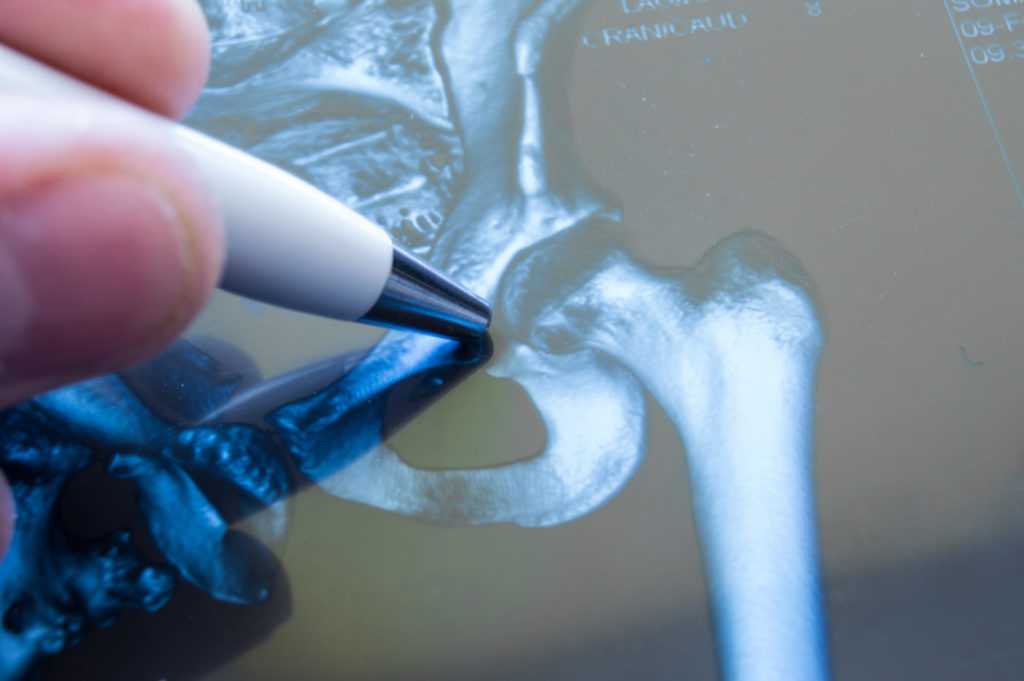Many people have a list of questions to ask before hip replacement surgery. To help, we’ve put some answers together for you to read before you make your decision. Whilst this can’t replace a consultation with your surgeon, we hope you find it useful.

Hip replacement questions and answers
Join us as we explore the ins and outs of hip surgery while helping to answer some of your questions.
Can an x-ray show if you need a hip replacement?
An x-ray of your hip may provide your consultant with information about the health of your hip joint. However, it is just one of the things your consultant will consider before discussing hip replacement as an option for you.
When is the best time for a hip replacement?
Everyone is different. Deciding the right time for a hip replacement will decide on a number of factors:
- Consider how the painful hip is affecting your daily activities, are you finding it hard to walk, dress, drive?
- Are you fit enough for surgery? Do you have time to do your hip exercises before the operation? Maintaining the mobility of your hip joint and strengthening the muscles around it will help your recovery.
How long does hip surgery last?
An artificial hip typically lasts between 10 to 15 years, but this will vary from person to person.
How do I prepare for hip replacement surgery?
You can help prepare for your hip replacement surgery procedure by downloading the ‘Pocket Physio’ app on your Apple or Android device.
The app features a host of pre- and post-surgery “how to” exercise instructions which allow you to prepare thoroughly for your surgery and make a strong recovery postoperatively.
How can I reduce pain while waiting for a hip replacement?
- keep moving but don’t overdo it and put too much strain on your hip
- take pain relief such as paracetamol if it helps
- try regular ice packs (wrapped) applied to the area for up to 20 minutes every 2 to 3 hours
- try gentle hip stretching exercises – such as those on the ‘Pocket Physio’ app
- if you are overweight, losing weight may ease the pressure on your hip joint
- wear comfortable supportive shoes with a good sole.
What should you not do before a hip replacement?
Your GP or consultant is the best person to advise you on what not to do before hip replacement surgery. Preparing for the best recovery means switching to a healthy diet and stopping smoking.
Talk to your doctor about your medications, and ask for advice on any activities you think may be making your pain worse.
Should I walk while waiting for a hip replacement?
Patients who maintain a reasonable level of fitness before surgery often have better results. Even moderate exercise can help so try to do what you can and take advice from your GP if you’re not sure.
What do I need to buy before hip surgery?
Due to the nature of your surgery it may be necessary to provide some equipment to help you at home. This is not always required following hip surgery, however this should be discussed with you and arranged in the pre-assessment clinic.
Following your surgery you may also be issued with:
- leg lifter to help aid the movement of your leg in the initial stages
- shoe horn
- sock aid
- helping hand
- bath sponge
What is the BMI requirement for hip replacement?
Generally an obese Body Mass Index (BMI) is 30 and above. However it does depend on your height and weight. Ask your consultant about their hospital’s safe criteria for treatment as this can vary by location.
What is the maximum weight for hip replacement?
There is no specific weight limit that dictates who can have hip replacement surgery. However, implants in overweight patients are unlikely to last as long as those of a healthy weight. Furthermore, obese patients are more likely to suffer from post-surgery complications such as infections.
What are the risks of hip replacement surgery?
All surgical procedures have risks, but the chances of serious complications following hip replacements are very low – less than one per cent. Complications can include dislocation, infection, injury to the blood vessels or nerves, a fracture or a difference in leg length. Any limb length discrepancy is usually minimal and will not affect your gait pattern.
Hip replacement questions to ask your surgeon
The following set of questions to ask a knee replacement surgeon focus on the operation itself and the potential outcomes.
Which method of hip replacement is the best for me?
Your consultant will be able to determine what type of hip surgery you need. Once they have decided, they will be able to explain what you need to do and provide information.
Which type of implant do you recommend for me?
There are three different types of material used in hip replacement surgery:
- metal
- ceramic
- Polyethylene
Your surgeon will decide on the best material for you depending on your needs, age and level of physical activity.
What tests are done before hip surgery?
Prior to your surgery, you’ll have a full consultation. This involves a physical examination as well as investigations such as x-ray and (occasionally) an MRI scan.
Do I need an MRI scan before hip replacement?
The need for an MRI will depend entirely on how damaged the affected hip is.
Should I lose weight before my hip replacement?
Ideally, it will be beneficial to maintain a healthy weight leading up to your surgery. This could help to reduce the length of your recovery and the long-term success of your implant. Patients that are severely overweight may not be eligible for surgery. Weight gain post surgery will increase the strain on the artificial joint. This could cause pain levels to increase, or prolong recovery times.
What should I do the night before hip surgery?
The night before your operation is a crucial time. It’s likely you’ll be a bit nervous for the day to come, but you also need to be prepared. Try to get as much sleep as you can and adhere to any fasting requirements as stipulated by your doctor.
How long do I have to fast before hip replacement surgery?
Don’t eat or drink if you’ve been told not to. If your doctor has advised you not to eat or drink for a specified period of time before your operation, always follow their advice. This includes light snacks, sweets and water. If you don’t then your operation might be cancelled.
Why do you take a urine sample before surgery?
A urine sample will only be taken if the patient:
- has a history of urinary infection
- is currently showing symptoms of urinary infection
- is female and of childbearing age to check whether you’re pregnant
Urinary tract infections, renal diseases, and uncontrolled diabetes are among the conditions tested for.
What pain medications can I take after hip surgery?
Consider simple analgesics such as paracetamol, Ibuprofen (orally or gel rubs). Speak to your GP or pharmacy for appropriate guidance on medication that is right for you.
Additionally ice helps reduce swelling. If you have ice packs already at home then make sure they are ready in the freezer for when you get home. Alternatively you can make an ice pack by wrapping ice cubes in a towel or using a bag of peas wrapped in a towel.
- Never put ice packs directly onto your skin
- Always use a clean tea towel or pillow case to wrap the ice pack in
- Do not use the ice pack on your skin for more than 15 minutes
- Always check the skin condition after using ice. Redness of the skin following the use of ice is expected.
Hip replacement recovery questions
Once your surgery has been completed, it’s likely you’ll want to get back on your feet as soon as possible. Although patients recover at different rates, the answers below should give you an idea of what the road to recovery will look like.
Will I make a full recovery?
Most people are back to normal within two to three months, but it can take up to a year before you fully benefit from your new hip.
When can I return home after hip surgery?
At a Practice Plus Group hospital we will gently have you on your feet on the same day or first day after surgery, and with the support of our physiotherapists you will be mobile enough to go home the same day or up to three days after your operation.
What should be avoided after hip replacement surgery?
Following your hip surgery there is a small risk of dislocating the new joint. The main risk is in the first six weeks when the muscles are at their weakest. This is why it is important to exercise regularly to strengthen the muscles and to support the hip.
Within the first six weeks it is important to follow some hip precautions to minimise the risk of damaging the new joint. Please ensure you follow these recommendations:
- do not cross your legs either in sitting, standing or lying
- gently lower yourself onto your chair/toilet with your operated leg out in front
- do not lean forwards once you are sitting, you must not flex your hip over 90 degrees. Your knees should remain lower than your hips in sitting
- do not try to reach your feet or stretch up to reach high levels. Try to use your long handled equipment that will be provided for you
- sit in a high arm chair. Use your hands to assist you in sitting and rising from the chair
- no twisting or pivoting on the operated leg
- do not lift heavy objects
- at night, sleep with two pillows between your legs. You may turn in bed as long as the pillows are between your legs.
What hurts the most after hip replacement surgery?
It’s not unusual to experience pain in other weight bearing joints following surgery. It is likely you’ll have pain in your hip and groin. This is nothing to worry about; it’s a perfectly normal reaction as your body adjusts to the new implant. You may also experience discomfort in your thigh and knee. This is normally due to post-surgery bruising and swelling.
How long are you on bed rest after a hip replacement?
Within 24 hours of surgery you will be sitting up in bed. A physiotherapist will then assist you onto the edge of the bed. With help from the physiotherapist you will transfer from your bed to a chair using a walking frame. You will then be able to practise your walking using a walking frame.
What is the fastest way to recover from a hip replacement?
The best advice is to follow the instructions of your doctor. They will be able to direct and support you in making a full recovery. However, there are still some things you can do to help speed up the process:
- Walk frequently (when permitted by your doctor)
- Attend your physiotherapy sessions and complete your exercises
- Get plenty of sleep
- Eat a healthy, balanced diet
How long does it take to walk normally after hip surgery?
It is important that you begin a walking programme once you get back home to build and maintain your muscle strength and your blood circulation system. You should aim to do this walking programme as well as your normal daily activities and your home exercise programme.
Aim to walk for a certain period of time rather than to walk a certain distance. Gradually increase the time you walk, as you feel comfortable.
Walking guideline:
| Days 1 – 4 | 5 minute walk twice a day |
| Days 4 – 8 | 10 minute walk twice a day |
| Days 8 – 12 | 15 minute walk twice a day OR 30 minute walk once a day |
| After day 12 | 30 minute walk once a day (you can increase the distance if you new joint feels comfortable) |
Hip surgery FAQs
Not quite found what you’re looking for? Our FAQs might be able to help! Read on for more hip surgery information.
The general advice is to sleep on your back and not on your side due to the risk of dislocation. While sleeping on your back, it’s also a good idea to prop your leg up. You can do this by stacking pillows.
Be sure not to cross your legs or ankles. After a couple of weeks, you can lie on your side with caution with a pillow between your legs.
Transferring out of bed
Following your surgery you will be helped out of bed by a member of the healthcare team. The physiotherapist is there to help you, but it is important to remember that you will be able to do most of the work yourself.
It is most likely that you will get out of bed the same side as your operated leg. Use your hands on the bed to move your bottom closer to the edge of the bed. You can bend your non-operated leg to help you lift your bottom off the bed and move it across. Once you are near the edge of the bed you can lower your operated leg over the edge of the bed. Use your hands on the bed to guide your bottom round so you can place your feet down to the floor.
Once you are sitting on the edge of the bed you can rest there until you are ready to stand.
Transferring back into bed
When you are ready to get back into the bed, position yourself closer to the pillows near the head of the bed and try to ensure you guide your bottom back onto the bed as much as possible before you lift your legs up into bed. Keep your knee facing up to the ceiling to avoid twisting of the leg. Use your hands and the non-operated leg to manoeuvre yourself in the bed to make yourself comfortable. Please ensure you ask for assistance if needed.
After six weeks you do not need the pillow between your legs at night and you can turn in bed to either side.
In the first six weeks after surgery, avoid using reclining chairs or sofas as they do not offer support. They can also be difficult to get out of.
The best chairs to use during your recovery are straight backs with armrests. You should try to keep your hips at a 90 degree angle.
Your hip is an artificial device, even if it feels “normal”. As with any artificial device, there is a risk of mechanical failure if you over-stress it. You are recommended to follow these precautions.
- Avoid being overweight
- Make every effort to lose weight if you are overweight
- Avoid lifting or carrying loads heavier than 30lbs (14kg)
- Avoid jumping or causing any significant repetitive impact on your hip
- Use the bannister when climbing stairs
- Avoid strenuous or contact sports, but you may enjoy slower gentler exercises such as swimming or using an exercise bicycle
- It is usually okay to drive after 6 weeks. Please discuss this with your consultant at your follow-up appointment
- Activities such as swimming are fine to return to as long as your wound is fully healed and you are confident to walk in the pool environment
- Stairs can be done with a normal pattern rather than one leg at a time
Because you should not bend at your hips to reach your feet, putting on anything over your feet will be a real challenge at first.
Please consider the movements needed to dress very carefully, as they must be followed to reduce the risk of dislocating your new hip joint. Upper body dressing can be as your usual routine. Skirts can be placed over the head if possible and secured accordingly. Refer to the following for putting on lower garments.
The following are ways you can prepare yourself at home post-surgery:
- Ensure you have a support network in place – Family, friends, and work colleagues can all help out. Stocking up on food and drink, travel, and even mental wellbeing visits can aid your recovery
- Make your home fall-proof – removing rugs and other slip hazards is a good idea while you’re recovering. The last thing you want to do is suffer a fall and have to return to hospital
- Make sure everything you need is within reach – Moving your bed into a ground floor room will eliminate the need to climb stairs. You might also consider moving your TV into the room you’ll use the most while recovering. Alongside this, it’s also a good idea to invest in a grabber tool.
- Raised toilet seats – You may also require elevated toilet seats. The aim of these is to discourage bending too much at the hip.
It’s important to remember everyone recovers differently. With that said, it’s often possible to return to desk-based work after 6 weeks. It may take a little longer if your job involves manual labour.





